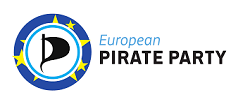Three European Libraries and MEP Julia Reda of the Pirate Party discuss the EU copyright reform and more
On the occasion of the proposed EU Copyright reform, which is currently undergoing a process in the European Parliament, representatives from three leading European libraries are asking Julia Reda, Member of the European Parliament with the Pirate Party about the challenges and the impact that the proposed copyright directive will have on libraries, institutional repositories, open science and more. Julie Roche, Lluis Anglada, Josep Matas and Giannis Tsakonas have joined in a dialogue with Julia Reda on EU’s crucial copyright reform plans.
Julien Roche, Director, LILLIAD Learning center Innovation, Université de Lille, France is asking:
Given the European situation and the different national contexts, how and to what extent will the EU copyright reform impact national laws – present and future – regarding copyright issues?
Julia Reda: Despite its disappointing level of ambition, the proposed copyright directive is still the largest copyright reform proposal coming out of the European Commission since the InfoSoc directive. All Member States will have to change their national laws to bring them in line with the requirements of the new directive. Whether libraries and other actors in the knowledge community will end up being better or worse off depends largely on whether the two most contentious proposals will be defeated: the introduction of a new neighbouring right for press publishers and the obligation for online platforms – including research repositories – to install automatic filters to prevent copyright infringements. Research libraries are particularly worried about the impact of the proposals for a neighbouring right for press publishers (Article 11) and the content filter provision (Article 13).
In an open letter, they explain that the Commission has not taken into account the impact on open science, warning that these proposals “would restrict access to research and place administrative and legal burdens on institutional repositories”. If these two proposals become law, both of which have drawn heavy criticism from academics regarding their compatibility with fundamental rights, we can expect a long battle before the Court of Justice of the European Union to decide on the legality of the new directive, leading to legal uncertainty for many years to come.
Lluís Anglada, Open Science Director, Consorci de Serveis Universitaris de Catalunya (CSUC), Spain AND Josep Matas, Lawyer, specialized in intellectual property, at LEGALMENT, are asking:
With regards to compensation to rightsholders for the uses of works by libraries under an exception or limitation to copyright, and given that collecting management societies are becoming less and less representative, would it be possible to forbid any disposition that makes compensation mandatory and necessarily through collecting management societies?
Julia Reda: The European Commission does not propose mandatory compensation for any of the new mandatory exceptions. In the case of text & data mining, the recitals even explicitly state that compensation is not necessary, because the harm to rightsholders from text & data mining is minimal. However, the Culture committee in the European Parliament in its opinion recommends that Member States should be allowed to require compensation for text & data mining, a view which is supported by some members in Council. Therefore, it is currently more likely that the cases where compensation is required for the use of a copyright exception will increase, rather than decrease. It will be important for the library community to contact their representatives, especially in the national ministries that form part of the Council discussions, to explain that a compensation requirement for text & data mining is an unnecessary burden for libraries, because text & data mining does not create any harm to rightsholders.
With regard to other exceptions that may become mandatory under the directive, such as illustration for teaching or preservation, any existing compensation schemes at national level are likely to remain in place. Article 12 of the Commission proposal gives Member States the option to give publishers the right to claim compensation under copyright exceptions, even though they are not rightsholders themselves. The Culture committee even proposes to make this provision mandatory for all Member States. If that were the case, users of copyright exceptions would either have to pay more for the use of books and other texts, or authors would end up getting less compensation than they get today, because they would have to share with the publishers.
Given that none of the Infosoc Directive exceptions allow use of works for the purpose of promoting reading, would it be possible to include a new exception to the Directive that would allow libraries to perform this kind of activities, without having to go through legal insecurity and fear possible claims by rightsholders?
Julia Reda: To my knowledge, no amendments have been tabled in the European Parliament that explicitly refer to the goal of the promotion of reading, but I have tabled amendments that would encompass all elements that would be necessary in order to do so legally: A broadening of the preservation exception that would allow libraries and other cultural heritage institutions to make copies not just for preservation purposes, but for all purposes that fall within their public interest mission (this wording has been adopted by the Internal Market committee), an exception for the making available of copyrighted works by cultural heritage institutions (no longer limited to dedicated terminals on the libraries’ premises) and a broadening of the text & data mining exception to allow the automated analysis of texts to facilitate reading. Several Members of Parliament have also tabled an exception for e-lending, which would facilitate the libraries’ mission. Whether or not these proposals will be successful depends very much on whether the Parliament rapporteur Axel Voss (European People’s Party, Germany) is going to support these proposals, and whether they will be discussed in Council as well. For that purpose, at least one Member State government will have to bring these proposals into the debate.
Giannis Tsakonas, Acting Director, Library & Information Center, University of Patras, Greece, is asking:
How the link tax and its extension in scholarship communication will affect the growth of qualitative research in countries that are marginalized in terms of language or in terms of funding?
Julia Reda: In an unexpected turn of events, the European Parliament’s industry and research committee recommended to extend the proposed neighbouring right for press publishers (also known as link tax) to scholarly publications. This would be a disaster for open science in general, because it would give publishers even more power to control the dissemination of research results. Even open access publications could be affected if they are published through a traditional academic journal via gold open access. At the very least, publishers could ask for more money from academics in the form of article processing charges in return for relinquishing any claims under the publisher’s neighbouring right to make the articles truly open access. Even the original Commission proposal for a link tax solely on news articles will be harmful to academic disciplines that rely on news articles as source material, however. Whenever news articles would need to be copied, linked to or incorporated into academic articles, for example in communications science or political science, an additional layer of rights would need to be cleared with the publishers.
Not all Member States have adequate copyright exceptions that would also apply to the new neighbouring right. The new right is supposed to apply retroactively to all news articles published in the last 20 years, so libraries and universities would have to check a significant number of previous publications, online databases and other research materials to make sure that they don’t violate the new right. Given that all experiments with the link tax so far, namely in Germany and Spain, have had a negative impact on the publishing market, there is no reason to keep pushing this harmful idea.
About Julia Reda:
Julia Reda was elected to the European Parliament for the Pirate Party in 2014. She is a Vice-Chair of her parliamentary group, the Greens/European Free Alliance. In the European Parliament, she serves as a coordinator for the Greens/EFA in the Committee on Internal Market & Consumer Protection (IMCO) and as a member of the Legal Affairs committee (JURI). She co-founded the Digital Agenda intergroup. Her legislative focus is on copyright and internet policy issues. In 2015, she was responsible for the Parliament’s evaluation of the Copyright Directive. She currently represents her political group in the negotiations on the proposed directive on copyright in the Digital Single Market.
Born in Bonn in 1986, Julia Reda was a member of the German Social Democrats for six years before joining the Piratenpartei in 2009 amidst a debate on internet blocking. She served as chairwoman of the party’s youth wing from 2010 to 2012 and is a founder of the Young Pirates of Europe. She holds an M.A. in political science and communications science from Johannes-Gutenberg-University Mainz, Germany.
You can follow Julia on Twitter or on Facebook.
About the Pirate Party
The global Pirate Party movement was born in 2006. Pirates, who believe in using technology for the empowerment of all, have so far enjoyed significant electoral success in Sweden, Germany, Iceland and the Czech Republic and have raised the visibility of their techno-progressive agenda across Europe.
About Julien Roche
Julien Roche has served as Director of the libraries of the University of Lille – Sciences and Technologies, since 2005. He has been leading a strategic project for the University of Lille, the creation of the LILLIAD Innovation Learning Center, to support the innovation process of the university, including a new building opened in September 2016.
From 2010 to 2016, Julien has served on the LIBER Executive Board. He has also been the Chair of the LIBER Steering Committee on Reshaping the Research Library and has led the leadership Working Group, which is responsible for two leadership programs: the leadership seminar (part of the LIBER brand since 2011) and the LIBER Journées programme, launched in 2015.
Julien Roche has also several national responsibilities including co-chair of the French training professional program for newly appointed university library directors and vice-president of the French National university and research libraries, the ADBU.
About Lluís Anglada
Lluís Anglada has degrees in librarianship and in philosophy. He is member of the SPARC Europe Board, and has been meber of the LIBER Board and OCLC Global Council. He was the director of the CBUC – the Catalan Academic Library Consortium, and now is director of Open Science in the Catalan Consortium for Academic Services.
About Josep Matas
Josep Matas is a graduate in Law and History. He is an archivist, now in leave of absence, under the administration of the Generalitat de Catalunya (the government of Catalonia), and was president of the Association of Archivists of Catalonia (1993-1997). Since 2003, he works as a lawyer specialized in copyright and information law.
About Giannis Tsakonas
Giannis Tsakonas holds a BA in Librarianship from the Department of Archives and Library Sciences, Ionian University, Greece and a PhD in Information Science from the same Department. Currently he works as Acting Director in the Library & Information Center, University of Patras.
In parallel, he is research associate in the Database and Information Systems Group, Laboratory of Digital Libraries and Electronic Publications, Department of Archives and Library Science, Ionian University, Greece.
Since July 2016, he is member of the Executive Board of LIBER (Ligue des Bibliothèques Européennes de Recherche – Association of European Research Libraries) and of the Board of Directors of Hellenic Academic Libraries Link. Since December 2016 he is appointed Vice President of the Hellenic General Council of Libraries, a body of the Ministry of Education, Research and Religious Affairs monitoring the operation of Greek public libraries.












